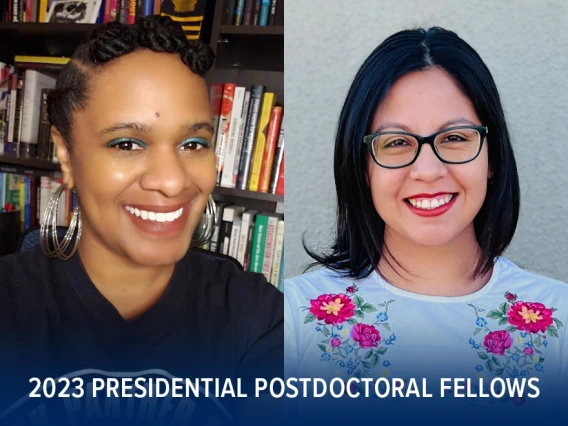
Two of the five scholars in the inaugural class of the President’s Postdoctoral Fellowship Program will join the College of Humanities, paired with faculty mentors for a year of research and professional development.
Lisa Covington, of the University of Iowa, will work with Dr. Bryan Carter in the Center for Digital Humanities and Africana Studies Program, while Tania García-Piña, of the University of Texas at Austin, will work with Dr. Santa Arias in the Department of Spanish and Portuguese.
“We’re pleased to welcome these two innovative scholars with the sort of support and guidance that can make an impact on their careers,” said Alain-Philippe Durand, Dorrance Dean of the College of Humanities. “Their projects are intriguing examples of how the research in the humanities can have far-reaching implications and truly impact the lives of people around the world.”
Covington is a doctoral candidate in sociology of education at the University of Iowa, with certificates in Digital Humanities and African American Studies, whose research explores media representation of Black youth. Her fellowship research proposal, “A Digital, Comparative Analysis of Black Girlhood in Hollywood & Independent Films,” will focus on expanding her sociological research on Black girls in film and the development of a digital database to serve as a public facing platform for community members and scholars.
“Lisa’s work on Black Film and Digital Humanities, more specifically, the analysis of Black Girlhood in Hollywood and Independent Films fits perfectly with the work the Center for Digital Humanities is already doing with The Dunbar Pavilion, the historically segregated school here in Tucson that has since become an African American community center,” Carter said. “The Africana Studies Program and Center for Digital Humanities are working with Dunbar to establish a community resource center and historic archive, and Lisa’s work with Black youth blends perfectly with this established collaboration.”
Dr. Praise Zenenga, Director of the Africana Studies Program, said “All of us in the Africana Studies Program are excited at the prospects of hosting a much needed Postdoctoral Fellow to our Bachelor of Arts’ second thematic area, which deals with Performance, Media, and Digital Africana Studies. Dr. Lisa Covington’s research, study abroad experiences and community engagement credentials make her an attractive candidate for our Program which advocates for experiential learning tied to inclusive engagement and outreach initiatives.”
García-Piña is completing her Ph.D. in Iberian and Latin American Languages and Cultures at The University of Texas at Austin. Her academic work encompasses Latin American literature, culture, and ethnohistory, with expertise in intellectual production, identity, and colonial politics. Her fellowship research proposal, “Writing a People: Indigenous Politics, Agency, and Identity in Huexotzingo” will analyze Indigenous modes of political representation and contribute increasing discussions of Indigenous cultural production in Mexico and how diverse peoples have actively engaged with cultural and political shifts over time.
“The history of the conquest of Mexico still has great significance particularly now because of the 500 years of the arrival of Cortés and the fall of the Mexican capital,” said Arias, Professor and Head of the Department. “Thus, her project is essential, timely, and the resources and mentoring that she can receive at the University of Arizona could help her turn her dissertation project into an important book because of her concern on the role of indigenous women and historical range. Tania is well prepared to undertake this project – she is a Nahua-speaking scholar with field research experience.”
The program was started by the University of California in 1984 to provide postdoctoral scholars from a variety of backgrounds a pathway to pursue careers in academia. The university expanded the program in 2011 to invite other institutions to participate. The University of Arizona joined in 2021, with President Robert C. Robbins describing an advantage in the alignment with the Arizona Advantage pillar of the University's strategic plan, which calls on the University to drive social, cultural and economic impact and reinforce its commitment to diversity and inclusion.
Anyone who has finished a terminal degree is eligible to apply for the fellowship. The University of Arizona's selection process involves gathering feedback from faculty experts in each applicant's field, as well as input from department heads, deans and senior leadership. President Robbins makes the final selections and there is potential for a renewal year.
“I am very proud the University has joined the President's Postdoctoral Fellowship network," Robbins said. “We have invested a great deal in creating pathways to success for our students. Taking the same kind of approach for talented scholars and scientists from diverse backgrounds to begin academic careers enriches our University community and upholds our values as an institution. I am looking forward to welcoming our first cohort to campus in the fall and to the impact they will have in their careers.”

